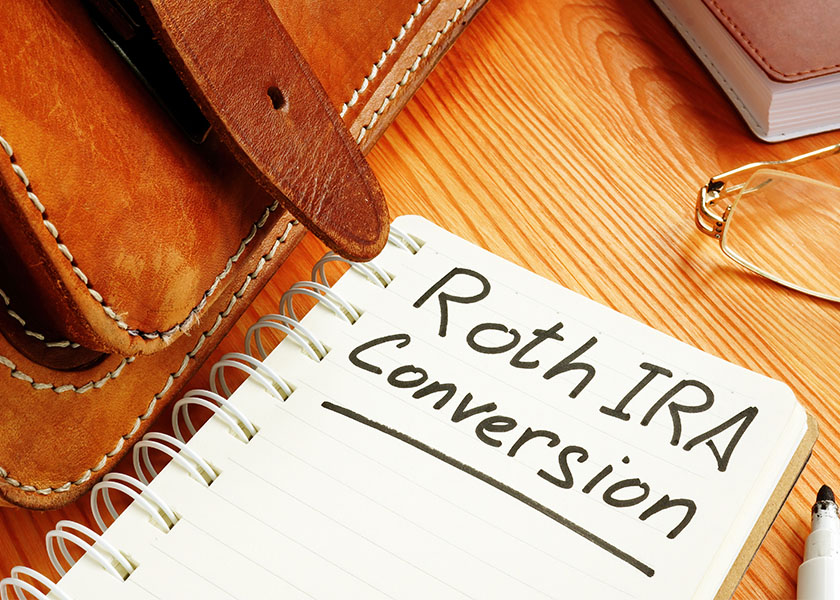Understanding Roth Conversions
A Roth conversion is a process where you move funds from a traditional IRA or 401(k) into a Roth IRA. Unlike traditional retirement accounts, Roth IRAs offer tax-free growth and tax-free withdrawals in retirement, making them an attractive option for many investors. What this means is you move money that is taxable, and subject to required minimum distributions (RMDs), to an account that is tax-free for life and not subject to RMDs. This is a complicated process and has some benefits and downsides. Before doing a Roth conversion, it is important that you get good financial and tax advice.
Tax Implications
One of the key considerations when deciding whether to do a Roth conversion is the tax implications. When you convert funds from a traditional IRA or 401(k) to a Roth IRA, you’ll need to pay taxes on the converted amount in the year of the conversion. This can result in a significant tax bill. Keep in mind, we do not recommend that you pay the taxes with your IRA, so you will want an outside source to pay these taxes, like cash or a brokerage account. In the past, you were able to undo Roth conversions, but this is no longer an option. This brings up another reason why you need to carefully make this decision with good financial and tax advice.
Income Level
Your current income level can impact the decision to do a Roth conversion. If you’re in a lower tax bracket now than you expect to be later in life, a Roth conversion could be beneficial since you’ll pay taxes on the converted amount at a lower rate now than you would when you’re in a higher tax bracket later.
A Unique Window
For some people, we see a window of opportunity for tax savings strategies like Roth conversions after you retire, but before you are tapping into IRAs and taking your social security. For example, let’s say our client retires at age 65, and plans to take social security at 70. They plan to live off their brokerage account before they reach RMD age at 73. What this means is this person could have a window where they will be in a lower tax bracket from age 65 to 70, and maybe even 73. We have a 5-8 year window that we could be taking advantage of Roth conversions. This doesn’t apply to everyone, but for people in a similar situation, this could be a long-term tax saving strategy. This is may be beneficial for people who have very large IRAs and 401(k)s (over the $1.5 million range).
Legacy Planning
Your legacy goals can also impact your decision to do Roth conversions. If you want to leave a tax-free legacy to your heirs, a Roth conversion strategy could be an efficient way to do this. One thing to keep in mind is that your beneficiaries inherit your Roth IRA and, like yourself, they don’t pay taxes on any distributions. However, if your beneficiaries inherit your IRA, they will have to pay taxes on every dollar distributed. There is also a new rule that if your beneficiary is more than 10 years younger than you (not including spouses), your beneficiary has to liquidate the entire account within 10 years. This can cause higher taxes and less of your hard-earned money going to those you love.
We can help.
Roth conversions can be a powerful tool for retirement planning, but they’re not right for everyone. You need to carefully consider your tax situation, income level, and retirement goals so you can determine whether a Roth conversion is the right move for you. For Bloom Wealth Advisors clients, this is a strategy we are always monitoring and considering. Reach out to us if you have questions about Roth conversions and if you want to find out if this could be the right strategy for you.
A Roth IRA offers tax free withdrawals on taxable contributions. To qualify for the tax-free and penalty free withdrawal or earnings, a Roth IRA must be in place for at least five tax years and the distribution must take place after age 59 ½ or due to death, disability or a first time home purchase (up to $10,000 lifetime maximum). Depending on state law, Roth IRA distributions may be subject to state taxes.
This blog is not intended to provide specific legal, tax, or other professional advice. For a comprehensive review of your personal situation, always consult a tax or legal advisor.
The example provided is hypothetical and for illustrative purposes only. This example does not reflect sales charges or other expenses that may be required for some investments. Rates of returns will vary over time particularly for long term investments.


